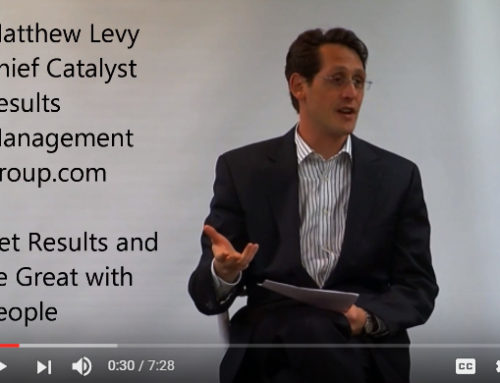“I need my people to be honest with me ─ tell me what I need to hear ─ and push themselves to get the results without me having to push them.”
─ a frustrated CEO and client
The Problem:
Sometimes, even the intelligent and talented fall short of stellar performance. Are they just afraid to push it when their results suffer?
The Real-Life Situation:
The VP of Supply Chain and a client was a very successful executive with a strong pedigree — top of his class at West Point, MBA from a top school, and previously a strategy consultant.
He was charged to lead a major cost-cutting initiative with a $50 million target.
By the end of Q1 it was easy for Mark to see that the company was not going to achieve $50 million — and not even the $35 million that the collective business unit executives were promising for the year.
Mark spoke with the divisional President and with the CEO to feel their commitment, but he just wasn’t getting the support he required to deliver the $50 million that the board requested. From the CEO through to the divisional Vice Presidents, commitment to $50 million was lacking. The CEO was prepared to give the board whatever the company achieved — without sweating it.
Set-up for Failure and a Decision Point:
From Mark’s perspective, he was set up for failure and he had to make a choice. He could either:
1) Acquiesce, try for the $35 million in savings and miss the board’s $50 million target, or
2) Push for the $50 million and go squarely against the grain to make it happen
He was sure that either could get him fired. Or, was there a better option?
The Outcome
With some encouragement and coaching, Mark decided to push it. He gracefully and brilliantly got himself invited into the Board of Directors meeting to present the status of the initiative. Being fully supportive of the CEO he explained other reasons the company was going to achieve their target and also what he needed to succeed. Without throwing the CEO under the bus and as hoped for, his presentation caused the board to put the needed pressure on the CEO which provided the missing support for the initiative.
Result: His tenacity and grace were the impetus for the company to snap into alignment from the board of directors down through the CEO and the business unit Vice Presidents. Cost cutting came in at $43MM. Not the $50MM the board wanted, but more than $8 million beyond the Q1 commitments — far beyond what would have been achieved without the intervention.
As a leader, this is how you can make it safe for people to push through to the next level of performance:
- Ensure that your goals and your uncompromising commitment to success are clearly understood
- Say what you need to say and do your best. Be willing to push it yourself
- Invite creative, contrarian, and even outrageous views on how to win
- Reward people with a genuine appreciation for telling you what they think, even when you don’t agree.
- Make sure your people know you trust them and value them so they don’t choose to play it so safely that you miss your numbers.
- Let them know over and over again that you want them to push it!
Shoot us a note to start a conversation about how your company can empower you people to overcome barriers and limitations, snap into alignment, and ensure significantly better results.
 Matthew Levy is the Chief Catalyst and principal of RESULTS MANAGEMENT GROUP, LLC, a growth management consulting and executive coaching firm that dramatically shifts business results by: facilitating the creation of compelling visions and strategies, aligning executive and other management teams, developing an organizational capacity to manage execution and designing organizational environments that support the attainment of dramatically better results in any area.
Matthew Levy is the Chief Catalyst and principal of RESULTS MANAGEMENT GROUP, LLC, a growth management consulting and executive coaching firm that dramatically shifts business results by: facilitating the creation of compelling visions and strategies, aligning executive and other management teams, developing an organizational capacity to manage execution and designing organizational environments that support the attainment of dramatically better results in any area.







At a different client, the Marketing VP had just started the job and was excited to succeed. Both Marketing and the sales call center reported to him. The company’s revenue growth goals were extreme – “it’s a hockey stick,” the CEO liked to say. This marketing executive was better than any other I have met at predicting how many leads and how much revenue would come from every dollar invested in marketing. But, he was unwilling to recommend the breakthrough marketing campaigns that would be required to hit the sales targets because he was afraid to suggest exceeding the underfunded marketing budget that was established before he arrived. He believed that he was more likely to get fired for suggesting the company exceed the marketing budget than for missing the lead generation and revenue numbers. Interesting, right? Not to him. For him it was a very stressful and paralyzing situation. He was afraid to lose his job and the company had millions to lose — and the CEO didn’t even know it.
It took some time to get this very accomplished executive over the hump and to be willing to push it. When he did, he recommended new marketing campaigns with detailed forecasts and plans for conversation to sales. That did force critical conversations to test the executive team’s true commitment to the sales targets and also conversations about reallocating resources or acquiring new marketing dollars from the parent company.
And those results: successful marketing campaigns, new clients, millions in revenue and a higher sale price when the company was sold 2 years later.
Uncommon situation? Not really. This happens at every level of the company. Another client, the budgeting and finance manager in another company found some significant but not illegal errors related to accounting for repatriation of non-US revenue. As he dug to uncover the impact, he also found that the company was over paying its bank for millions in foreign exchange transactions. Not only was this investigation way outside of his role as budget manager, but the general managers and senior accounting staff were not concerned about either issue and dissuaded him from pursuing them. After some coaching and persuading, he decided to push it. Results: he negotiated lower ForEx transaction fees with the bank, saving the company over $200k/year, and the company implemented new accounting policies to accurately account for foreign sales. Now he is negotiating a raise and promotion to double his salary and a $50k bonus.